Wastewater Permitting Options in the State of Alabama
June 21, 2022
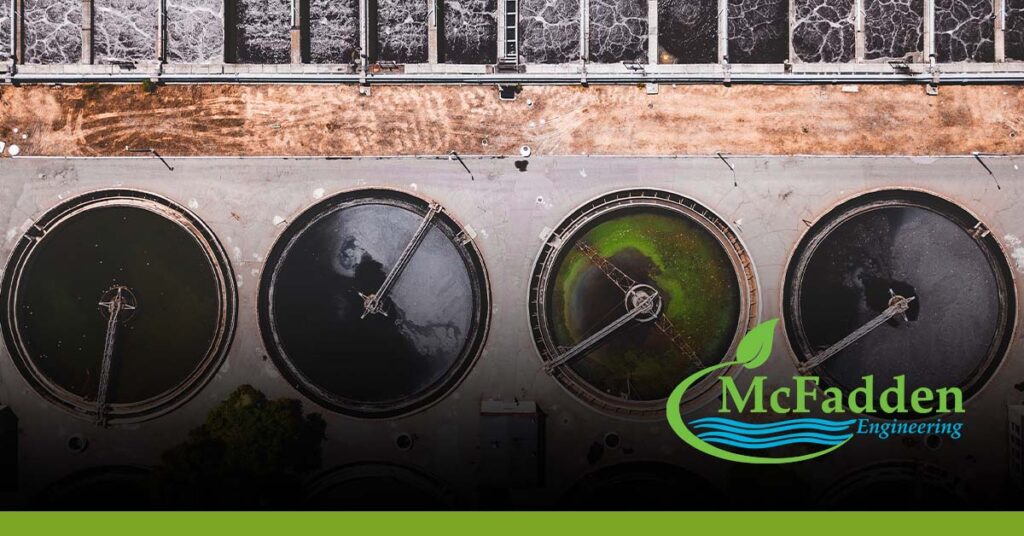
The major aim of wastewater treatment operations is to create safe water by extracting pollutants, removing contaminants and killing pathogens so that water reaches a permissible level of cleanliness to be discharged into nearby bodies of water and ecosystems. In addition to creating safe, reusable water, wastewater treatment facilities must follow regulations set at local, state and federal levels. The environmental permitting process can be tricky to navigate, as standards are always evolving. It can be hard for businesses to keep up.
In this blog, we discuss all the environmental permitting options for wastewater treatment facilities in the state of Alabama and how McFadden can help bridge the gap between your business and regulatory principles.
Water Reclamation in Alabama
The state of Alabama has two classes of reuse water: Class A and Class B. Water reuse can be defined as planned or unplanned and can provide alternatives to existing water supplies. In addition, water reuse applications can be used to ensure water security, sustainability, and quality. These two classes are defined as follows:
- Class A Reuse Water—Secondary treated wastewater that has, at minimum, received additional treatment and disinfection.
- Class B Reuse Water—Secondary treated wastewater that has, at minimum, been disinfected.
Class A and Class B water can be reused in numerous applications including the following:
- Fodder
- Fiber crops
- Ornamental nursery stock
- Sod and seed crops not intended for human consumption
- Pasture for animals not producing milk for human consumption
- Irrigation for golf courses
- Highway medians and roadside vegetation
- Cemeteries
- Other applications with ADEM approval
Options for Permitting Treated Wastewater Discharge in Alabama
According to federal guidelines, states can maintain primary regulatory authority by following these specific permitting ordinances:
- General NPDES
- Individual NPDES
- Underground Injection Control (UIC)
- State Indirect Discharge (SID) to POTW
- Onsite from ADPH
National Pollutant Discharge Elimination System (NPDES) Permit
The regulations and laws surrounding Alabama’s NPDES permit are in place to regulate point sources that discharge pollutants to waters of the United States. There are two NPDES permits that wastewater companies can acquire. These include:
General
- Permit based on activities at facility
- Permit limits are already published and established by regulators (i.e. non-negotiable)
- Enrollment through notice of intent process
Individual
- EPA Forms are required presenting expected effluent quality and treatment system
- Permit limits based on waste load allocation (WLA) for receiving stream
- Limits can be negotiated based on WLA results
Underground Injection Control (UIC) Permit
Any wastewater treatment facility that plans to inject fluid into the subsurface via an injection well must receive a UIC permit. A few keys to this permit are as follows:
- Requirement of land area with critical soils evaluation
- Permit limits are usually less stringent than a NPDES permit
- Subsurface Discharge
–Traditional disposal methods
–Injection wells
One aspect of this permit that should be noted is that the point of compliance for the permit is in the groundwater. Monitoring of groundwater for key parameters based on the characteristics of the waste stream will be required adjacent to the injection area. Also, plans should be made during the design process to limit public access to the application area.
State Indirect Discharge (SID) Permit
In the state of Alabama, a company is required to obtain an SID permit if they meet one or more of the definitions for an industrial discharger:
- Subject to categorical pretreatment standards
- Industrial discharges over 25,000 GPD
- Discharge makes up 5% or more of the flow to a POTW
- Any discharge that could potentially have an adverse impact on the POTW
Alabama Department of Public Health (ADPH) Permit
In the state of Alabama, the ADPH permit is required for onsite sewage disposal systems that fall into one of the following categories:
- Residential use
- Small flow commercial (<1,500 GPD)
These systems have very strict sizing guidelines set forth in the ADPH onsite disposal regulations. However, there is typically no monitoring of effluent or groundwater required for these systems.
Permit Evaluation
Before you start your next project, it’s imperative that you understand the regulatory process, treatment requirements and evaluate your ROI for treatment and disposal options. In addition, you must review typical monitoring requirements and permit terms to ensure your wastewater treatment facility operator:
- Reads and understands your permit requirements and keeps it accessible
- Expects regulatory visits
- Maintains documents and keeps good records
Taking time to perform basic housekeeping in your wastewater plant can save time and efficiency in the long run.
McFadden Engineering has established relationships with local, state and federal regulatory agencies and can help navigate the environmental permitting process on our clients’ behalf. Based in Alabama with licenses to operate in Georgia, Florida, Louisiana, Mississippi and Tennessee, McFadden Engineering can serve as the liaison between your business and wastewater the environmental regulators. Get in touch today to find out how McFadden Engineering can help solve your wastewater treatment facility’s permitting needs.
Process Optimization for Wastewater Treatment Facilities
May 25, 2022
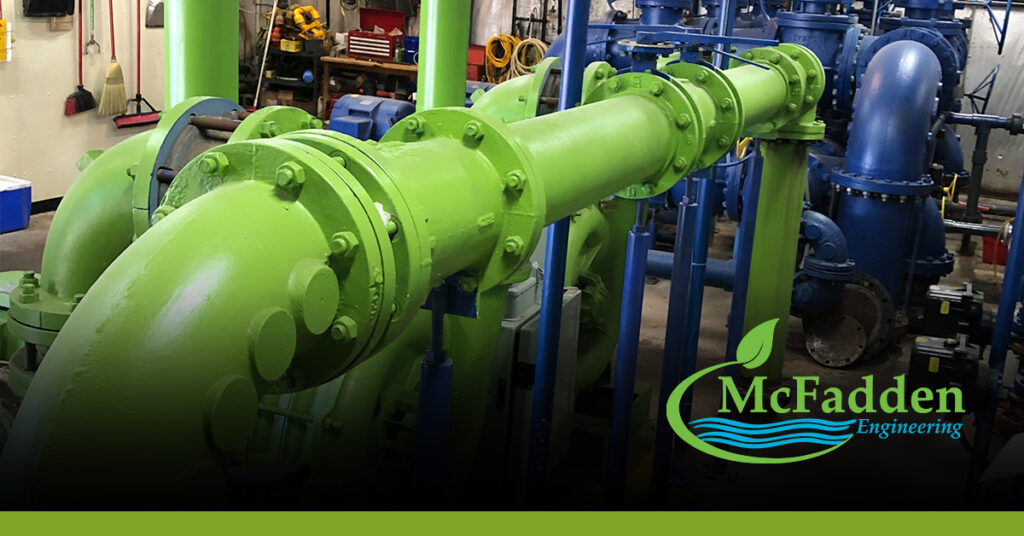
Wastewater treatment plants include numerous individual treatment processes within the overall treatment train. Each of these individual processes have optimum operating conditions that allow them to efficiently handle the specific parameters which the process is designed to treat. The misalignment of one of these parameters can result in a treatment process that is costly and difficult to maintain. In a worst-case scenario, your wastewater process can fail completely––leading to environmental compliance issues and poor effluent water quality.
By optimizing your treatment system and the individual processes, users can achieve consistent regulatory compliance, save operators valuable time and reduce overall operational costs at the facility.
The First Stage of Process Optimization: Parameter Evaluation
The first part of wastewater treatment process optimization includes a thorough evaluation of the process parameters that affect your wastewater treatment process. These parameters include:
- Permitted discharge limits
- Influent and effluent water quality
- Source water make-up
- Chemicals used in the wastewater treatment process
- Chemical and physical water characteristics
- Upstream and downstream processes
- Wastewater generating activities
During this evaluation, our team of engineers and wastewater operators will assess lab data to detect how the plant is processing wastewater. In addition, necessary testing and analysis (such as jar testing, biodegradability, etc.) can be conducted to evaluate the performance of the individual processes in the wastewater treatment facility. This can help our operators determine if plant operators are taking the appropriate steps to improve the plant’s overall performance and output.
After we complete a thorough evaluation of your current process parameters, we can conduct an equipment analysis and test other components of your plant’s process.
The Second Stage of Process Optimization: Equipment Operation Analysis
A typical approach to equipment review involves three main objectives: conducting an equipment audit, identifying equipment issues, and developing a plan to address the identified equipment faults. When equipment is evaluated by our professionals, we most often look at the yearly maintenance schedule to determine if the equipment is operating at its optimum level. An equipment audit review is an integral part of any organization’s wastewater treatment plan. Our equipment review findings can give us a glimpse into your plant’s wastewater treatment facility process and identify ways we can implement, upgrade or benchmark your plant’s process optimization. Based upon our findings, McFadden Engineering can develop a plan for operational adjustments, equipment upgrades and new chemicals for the treatment process.
The Final Stage of Process Optimization: Assess Operation
Performance assessment is an integral tool for wastewater treatment plants to operate on a cost-effective and sustainable basis. After the necessary wastewater treatment facility parameters have been evaluated and an action plan has been developed and implemented to address the outstanding equipment needs, our team will assess the wastewater plant operation. This includes a thorough review of monthly reporting to regulatory agencies and daily lab data, if available. In addition, maintenance logs and equipment history are usually very helpful in evaluating issues. Our team will also develop a list of priorities to determine which plant objectives to tackle first. In some instances, recommendations could include additional site training for the facility’s operator and staff.
Throughout this process, it’s imperative that our operators maintain a pulse on your plant’s progress to ensure an efficient and smooth-running system operation.
Enhance Your Wastewater Treatment Plant’s Efficiency with On-Site Engineering Consultants
All wastewater treatment facilities strive to reach their maximum outputs, while maintaining a smooth-running operation. Despite your plant’s best efforts to maintain a well-oiled operation, sometimes optimization is needed to achieve maximum efficiency. Optimization can take many different forms – this could mean anything from hiring additional wastewater operators to incorporating additional treatment processes to meet the overall needs of the facility. Our team at McFadden has a collective 100 years of working in wastewater management. We’re here to serve as allies for your wastewater plant––to help your plant achieve efficiency and run better than before.
For more information about McFadden Engineering’s Facility Management and Operations services, contact us.
Wastewater Operations and Facility Management
April 26, 2022
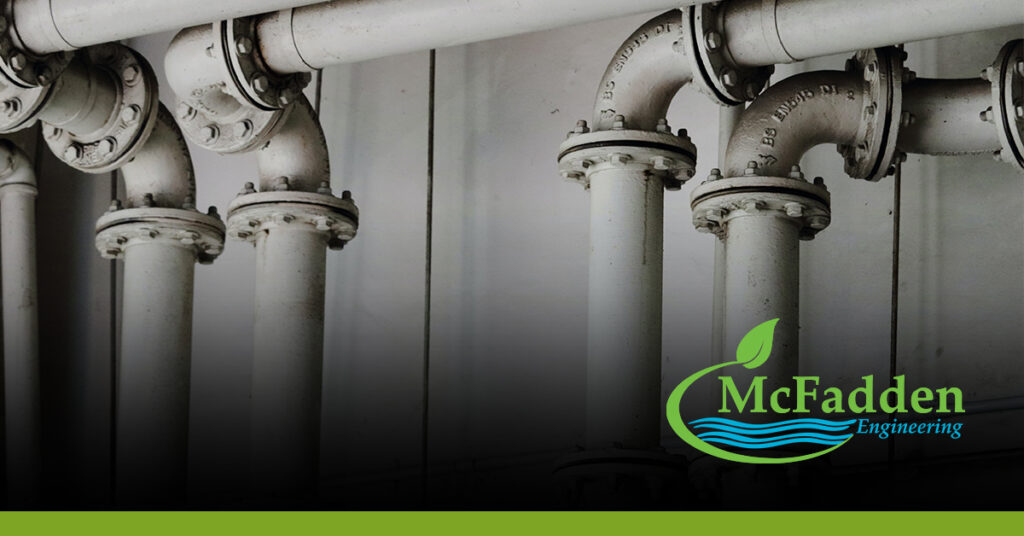
Many wastewater treatment facilities operate with an in-house facility management staff that is responsible for wastewater treatment operations. McFadden Engineering can ease the burdens many clients face when tasked to maintain general facility and wastewater treatment operations for their organizations. Our experienced Grade 4 wastewater operator and engineering staff offer training, maintenance and full-facility management to customers with small to medium flow wastewater systems, including schools, college campuses and small municipalities.
Our team always follows stringent environmental regulations and permit requirements to ensure the most sustainable approach to wastewater treatment.
Operations Options
Full Facility Management
For customers interested in complete facility management, this is a multi-step process that involves a thorough system evaluation, determining a need for equipment upgrades (if necessary), maintaining and optimizing existing facilities, streamlining process (i.e. process modifications, equipment maintenance procedures, etc.) and integration of new technologies as needed. We can help with the entire process or just individual phases or portions.
Achieving Plant Efficiency
McFadden determines the desired efficiency goals for all of our customers. Efficiency is mandatory for any organization, but especially wastewater treatment. Running a safe, efficient operation requires data evaluation which is done through process sampling. We look at the influent and compare to the effluent of the plant. We also compare to any discharge limitations the facility may have. To better understand the results we receive, we evaluate data “within the process”. This can help operators understand if adjustments need to be made or if additional treatment might be required to achieve the desired goals of the facility.
From an operational, geographic standpoint, McFadden Engineering designs, builds and evaluates processes for wastewater treatment plants in the Southeast. Due to the urgent nature and timeliness required for wastewater treatment plants operations, McFadden Engineering limits our operations to within a couple hours drive from Mobile, Alabama.
McFadden Facility Management and Operations
Whether your wastewater operation focuses on small to medium flow wastewater systems, schools, college campuses or small municipalities, McFadden Engineering can provide site assessment, maintenance for existing wastewater treatment operations, detailed assessments of overall plant efficiency and assist with process, controls and mechanical issues. If you’re looking for an engineering partner to handle the bulk of your plant management, provide general assessment and maintenance or assist in existing treatment operations, consider working with McFadden Engineering. Contact us for more information.
McFadden: Trusted Design Build Partner
March 25, 2022
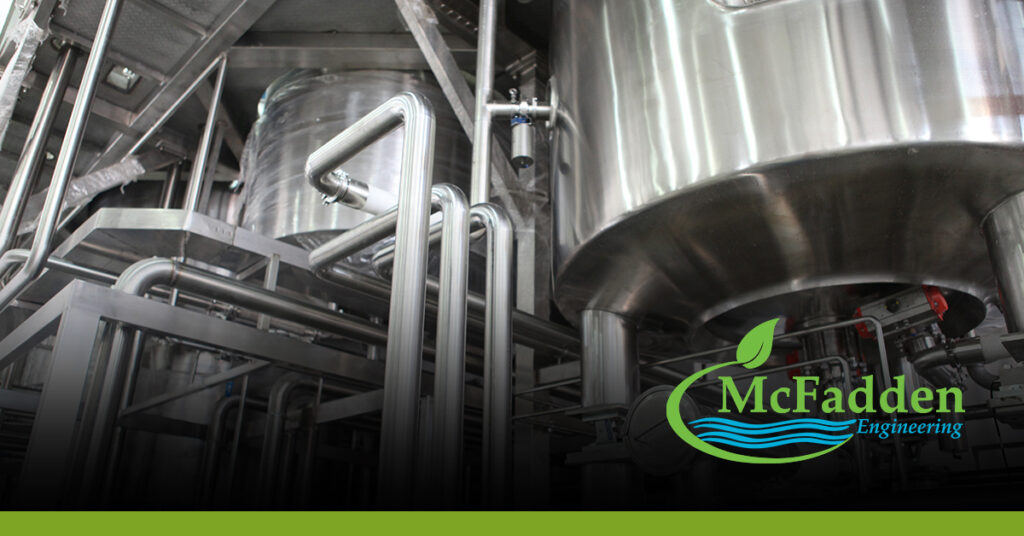
McFadden Engineering’s roots run deep in the state of Alabama, as the premier civil and environmental engineering firm in Mobile. In our latest site development projects, McFadden Engineering’s engineers worked alongside construction professionals to develop the scope, program and design of a few facility projects, of various sizes. From facility expansion and parking lot upgrades and drainage to site design services and irrigation system designs. Our engineers facilitated the permitting process and evaluation of each part of the project––from conception to occupancy. Read more to learn about our recent design build projects.
Facility Expansion Project: Threaded Fasteners, Inc.
Semmes, Ala.
McFadden Engineering helped Threaded Fasteners, Inc. (TFI) with their facility expansion project. TFI acquired a 4.50-acre parcel to the east of its existing manufacturing facility. To allow for further expansion of the manufacturing facility and the addition of a galvanizing facility, McFadden assisted TFI with site design and layout, grading, drainage design and the design of a detention facility that would allow for future expansion.
This project consisted of major site work to compensate for a 15-foot elevation drop between the existing facility and new property. In addition, a drainage plan was implemented, which included filling the existing detention pond area at its current location and expanding TFI’s current material laydown yard area. McFadden Engineering also assisted the site contractor with implementation of erosion control measures and ADEM permit compliance.
Read More About This Project Here
Parking and Drainage Upgrade: Bay City Free Will Baptist Church
Semmes, Ala.
Bay City Free Will Baptist (Bay City), a growing church in Semmes, Alabama, needed a parking lot upgrade, along with a newly developed drainage system. McFadden Engineering helped develop a commercial site plan design that provided Bay City with 70 new parking spaces and a detention pond to capture stormwater runoff from the parking lot. In addition, culvert pipes for the two existing access driveways to the church were upgraded to meet Mobile County specifications.
Read More About This Project Here
Civil Engineering Maintenance: Mobile Memorial Gardens
Mobile, Ala.
Since 1990, McFadden Engineering has been the consulting engineer for Mobile Memorial Gardens. For the last three decades, McFadden has performed numerous projects for the gardens such as civil site design services, design of irrigation systems, design of stormwater control structures, development of a GIS mapping system for the Gardens infrastructure, and design of wastewater disposal systems. More recently McFadden used GIS services to develop a boundary and plot layout for the proposed Veterans Garden, provided engineering services for a sewage pump design and construction at the facility and provided engineering and permitting services for expansion of the maintenance building at the facility.
Read More About Our History with Mobile Memorial Gardens Here
Ready to Work Together on Your Next Project?
Our projects––whether large or small––are all handled with the same priority and consistency. Our team works closely with regulatory agencies to bridge the gap between permitting and compliance issues, so that each step of the project flows smoothly––from start to finish.
We understand that project development entails a lot of moving parts, including new information, regulations, compliance, scheduling errors and more. If you don’t have a full grasp of the design build process, don’t worry, we’ve got you covered.
For more information about our design build process, or to work with McFadden Engineering on your next project, contact us!
Building & Maintaining a Pump & Treat Groundwater Remediation System Using Ozone Treatment Technology
February 16, 2022
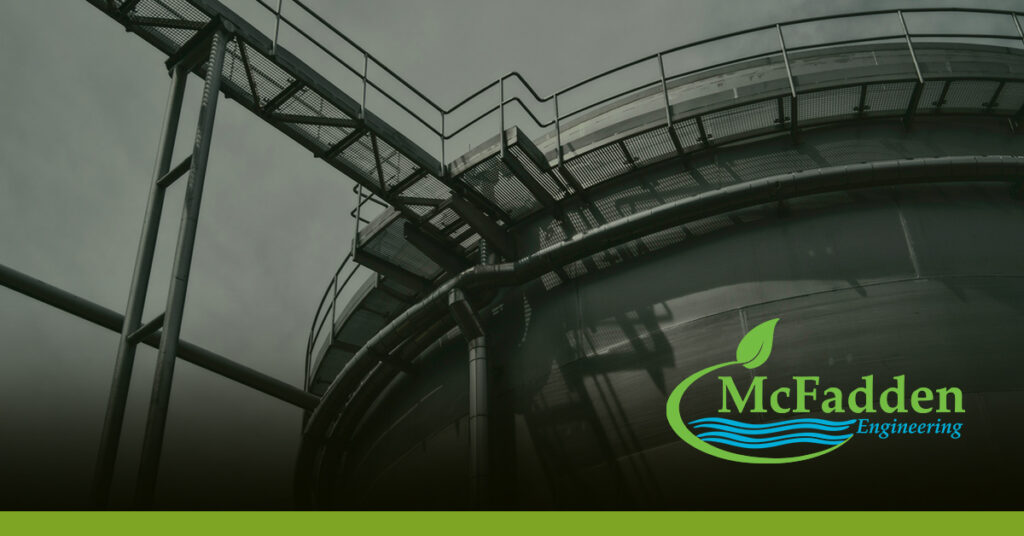
Groundwater pump-and-treat remediation systems are a valuable, proven technology, especially on the Gulf Coast where we have abundant rainfall, high groundwater, and relatively high groundwater storativity and transmissibility. On the correct site, and with the proper chemicals of concern, they can cost-effectively remove and destroy many groundwater contaminants. Pump-and-treat systems are scalable and can be sized to treat large or small contaminant plumes. Additionally, properly designed systems allow relatively easy equipment upgrades, increasing or decreasing the size of a pump-and-treat system to make the system more flexible, economical to run, or to increase or decrease the size of the area treated.
Pump-and-treat systems that use ozone to treat contaminants are particularly attractive, as ozone readily destroys nearly all contaminants that can easily be oxidized. Ozone can be manufactured on-site in a cost-effective manner and does not require storage to be implemented.
Ozone treatment systems do, however, require specialized design parameters and maintenance. These design and maintenance parameters are not difficult or expensive, but they cannot be ignored. Addressing these items during the design process, along with providing proper system maintenance, increases effectiveness, decreases costs, and keeps system downtime to a minimum, while maximizing treatment efficiencies. Many things need to be assessed to make a pump-and-treat system as cost-effective and efficient as possible. Some of the more important areas to consider are as follows:
Site Suitability
While pump-and-treat systems work well at many sites particularly along the Gulf Coast, they are not appropriate for all sites. Each site must be evaluated for suitability. The site subsurface should be evaluated by an engineer or geologist to determine whether a pump-and-treat system is appropriate. Soil conditions, aquifer withdrawal rates, and the area of influence of potential groundwater extraction locations all play a role in determining if a site is suitable for pump-and-treat technology.
Design
Once the site has been evaluated and determined to be suitable, the design process can begin. The pump-and-treat equipment should be designed according to the conditions unique to the particular site to capture and treat the contaminant plume. Adequate redundancy in the system design is necessary to cope with equipment breakdowns. The equipment should be designed according to site conditions and sized to treat the groundwater plume with the proper controls needed to maximize the system operation. Implementing adaptability and providing the necessary control functionality is vital. Having an experienced team of engineers and geologists is essential to the success of this process.
Furthermore, the choice of materials used in an ozone pump-and-treat system is paramount. Because ozone is a strong oxidizer, the materials specified in the system that will encounter ozone must not be resistant to oxidation. Schedule 80 PVC, stainless steel, brass, ceramic, and Viton™ are the materials of choice for such an application.
Installation
Groundwater recovery wells, groundwater well pumps, plumbing, electrical, and the ozone treatment system itself must be installed before the actual pump-and-treat process can begin. The equipment should be properly installed by licensed contractors who have the experience, training, and know how to perform the installation. Installing tracer wire with subsurface utilities will make future line location and servicing easier. Ease of access, reducing environmental impacts, security, site preparation, and installation of utilities should be considered during the design and layout of these types of systems. Disposal of treated discharge water needs to be properly permitted and addressed.
Maintenance
Proper maintenance of a system is the difference between a system that “works” and a system that performs optimally. Most pump-and-treat systems are designed to run continuously. The use of logs to detail maintenance types and schedules are vital to minimize costs and down time. These logs can be used to track completed maintenance activities, critical spare parts inventory, and life-cycle trends with equipment. These logs also allow your team to schedule preventative maintenance activities.
Ozone reacts and degrades many common materials. Material selection and maintenance is critically important to keeping ozone treatment system components running without interruption. Prior experience has taught us that schedule 80 PVC, stainless steel and brass components, ceramics, and Viton™ rubber gaskets, O-rings, and seals are materials of choice.
Controls
Wireless remote access allows the system to be monitored and adjusted without requiring personnel to be physically present at the site. This can save time and money and allows for electronic recordkeeping that details system run times, as well as system downtime. These controls also provide records that can be submitted to regulatory agencies for compliance purposes and to document system performance.
Expandability & Optimization
A pump-and-treat system should be designed in a manner that will allow for easy expansion. The ability to expand a system or focus groundwater treatment by withdrawing groundwater from specific areas can make a system more efficient and cost-effective. Based on data collected during the operation of the system and the changing size and concentrations in the groundwater plume, a properly designed system will allow for the user to easily increase and decrease extraction rates in specific areas of the system. This functionality allows the system to be easily optimized and treatment efficiencies increased.
McFadden Engineering has years of experience working with different site remediation systems in many different industries and applications. Our expertise in this arena is first class and we would love an opportunity to provide these services to your next project.
Authors: Bill Gardner & Marshall Eschete, P.G.
Master Planning Basics
November 30, 2021
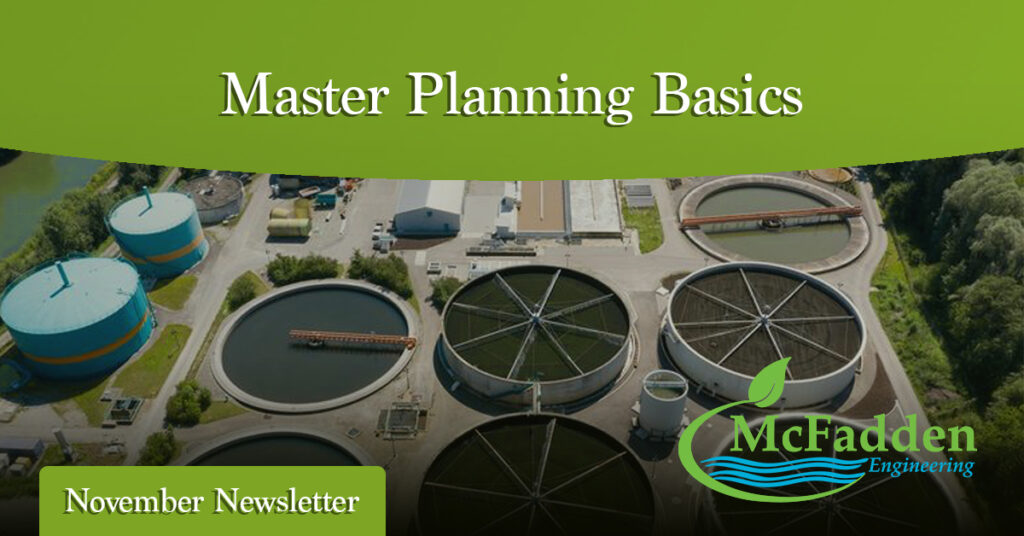
By: Brad Newton
Effective master planning water and wastewater systems can contribute to the success of your business. Master planning enables utilities to develop a strategy for funding infrastructure as well as determining the efficient timelines for the implementation of facilities and individual utility components.
Many utilities have the daunting task of prioritizing projects and allocating funds to maintain service areas. To do this, it is important to assess the existing conditions of the current infrastructure and identify critical areas that need to be addressed. Master planning answers 3 major questions for the utility through technical, operational, and financial evaluations –
- What projects do I need to do?
- When do I need to do these projects?
- How am I going to pay for these projects?
For a utility, master planning involves a number of steps with the ultimate goal of developing a plan to achieve long term sustainability. The following provides the basic outline of the steps in developing a master plan for utility:
Condition of the Infrastructure
The first step in the process is inventory and evaluation of the existing assets the utility has at its disposal. It is imperative to evaluate the overall condition of all infrastructure, identify equipment that needs repair or replacement, and determine areas of the system that are currently in good condition.
Capacity Review
By reviewing the capacity, it can be determined if the current facilities can meet the current as well as the future needs of the service area. This allows the utility to identify potential expansion areas, plan for the expansion and appropriately size the new equipment for the expected growth. This can easily be accomplished through the development of a hydraulic model of the water or wastewater network.
Water Quality Evaluation
Regulatory requirements drive the types of treatment facilities that are required or needed. Water quality evaluations are a great tool to determine if the current treatment equipment is adequately meeting current regulatory requirements. Customer expectations are also a consideration and should be addressed during this portion of the evaluation.
Repairs, Rehabilitation, and Replacement
By identifying problem areas and prioritizing repairs, costly emergency repairs and service interruptions can be minimized. This evaluation will also allow the utility to schedule and dedicate resources to specific areas that need more attention.
Operation and Maintenance
By reviewing the operation and maintenance records of a utility, opportunities for system upgrades, optimization, and increased efficiency can be identified.
Immediate Goals
When the information is collected and analyzed, a priority list can be established so that the utility can quickly address the most pressing issues.
Long-Term Goals
This requires the development of a plan that acts as the “roadmap” to meet future needs and provide a vision for expansion. By projecting future growth, these long terms goals account for the vision the leadership has for the utility and charts a course for how to achieve this vision.
Funding
Identification of avenues to fund these projects is one of the most important aspects of the master planning process. It allows the utility to identify revenue sources that will fund capital projects, as well as operation and maintenance needs. This evaluation is also used to determine how to generate affordable revenue streams for the utility through its fee structure.
Ultimately, the goal of the master planning process is to develop a plan that the utility can use to better meet the current needs of its customer base while looking to address the future needs of the system through infrastructure upgrades, system expansion, and new facilities.
McFadden Engineering develops master plans that allow our clients to have a “roadmap” for future success and assist with the implementation of the plan. Let us partner will you on your future project.
Managing Alabama’s Natural Resources
September 2, 2021
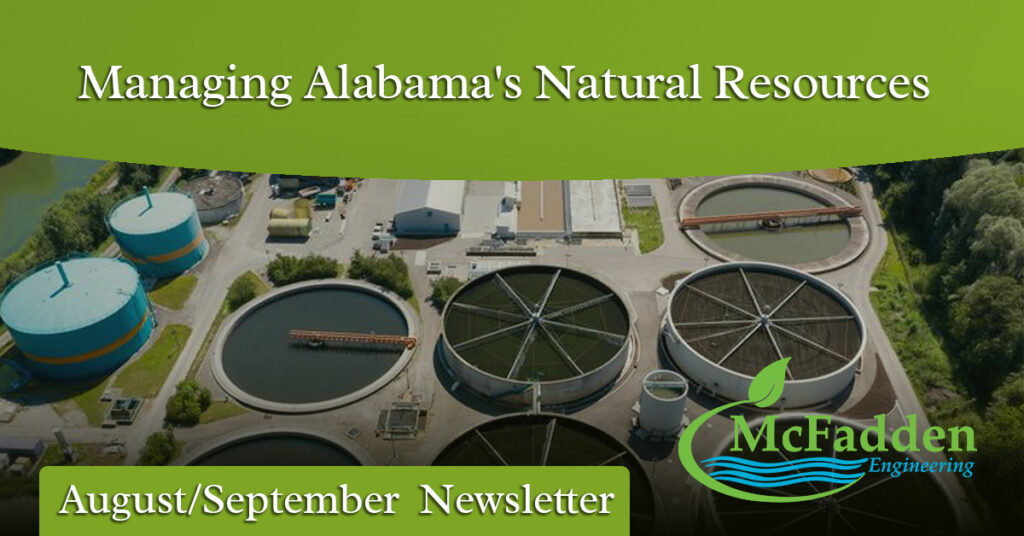
By: Frank McFadden
Alabama is blessed to have an abundance of surface water and rainfall, maybe too much rainfall during tropical events! The state boasts 16 distinct river basins; 129,700 total miles of rivers/streams; 59,000 miles of perennial (i.e., streams that flow year-round) rivers/streams; and 490,472 acres of lakes/reservoirs/ponds. So, if you like water sports, water-front property, or enjoy wearing a raincoat and boots, you are in the right state. With an abundance of water comes the obligation and duty to manage these vital natural resources to protect them for future generations. That duty has been promulgated by the Federal Water Pollution Control Act Amendments (FWPCA, PL-92-500) in 1972 to each state where management and enforcement duties were implemented.
Alabama’s agency for these duties is the Alabama Department of Environmental Management (ADEM) that was created by the Legislature in 1982 as a separate agency from the Alabama Department of Public Health. Since then, ADEM has been the prime agency for managing our abundant natural resources of air, water, and land via permits, studies, enforcement, etc. As one of the branch managers within the agency opined many years ago, “…we must do a pretty good job since industry, municipalities, and environmental action groups all stay upset at us…”.
So, whatever your philosophy concerning environmental matters, you can find an issue where government should be doing more, or maybe less! When you think about it, to perform all the activities that would be required by an agency like ADEM requires significant funding. There have been years where ADEM, and I’m sure agencies in many other states, did not get nearly the necessary funding from the state legislatures; and if not for federal funding, fines, and fees, would cease to exist or at best have limited resources to properly manage their environmental obligations.
Consider what is required if an industry or municipality needs to discharge a wastewater to a local stream, river, or bay. Their engineers determine the flow (gallons per day) of wastewater and make an application to ADEM. In turn, ADEM must determine how well the wastewater needs to be treated to not cause a problem in the receiving stream. The most accurate way to make this determination is to have an abundance of field-collected water quality data from the receiving stream, where a water quality model can be developed to set the level of treatment required in a permit issued to the discharger. However, to collect this data takes personnel and equipment, which is a function of time and money.
There is just not enough personnel or money to do this type of study for every applicant given the limited resources of the states and the number of requests for permits that are submitted on a yearly basis. As an alternative to this massive data collection effort, the EPA has promulgated procedures to estimate the data from a field study or calibrated and verified water quality model.
This alternative is spelled out in a Memorandum of Understanding between the EPA and the respective states, including Alabama, and is known as a “desktop” water quality model. As its name implies, this model can be developed at one’s desk using the appropriate software and published historical data.
The bottom line is for a very small amount of time and equipment (typically only a desktop or laptop computer), ADEM can model the stream, determine the allowable impact from the discharge and issue the appropriate National Pollutant Discharge Elimination System (NPDES) permit to the applicant. While “desktop” modeling is not as accurate as a full-blown stream data collection study and model, it is usually accurate enough to protect the receiving water from the treated wastewater.
If this proves not to be the case, the permit can be re-evaluated if water quality issues arise, conditions change, or new discharge limits need to be issued.
In summary, I hope you can appreciate the abundant natural resources we have in our state and others. I hope that you can also appreciate the daunting task the agencies have in managing and protecting these resources while accounting for individual and corporate rights. After all, as far back when David was writing the 8th Psalm, it suggests that we humans are to manage and protect our resources.
Although we have our ongoing challenges, this effort can be accomplished while supporting growth and development. It requires working from good science and engineering without an over-dose of emotion or greed.
Our team at McFadden Engineering has a long track record of working with regulatory agencies like ADEM. Or goal is to work with these agencies so that the needs of all stakeholders are addressed and that the natural resources we enjoy are protected.
PFAS: The Emerging “Forever Chemicals” Crisis
July 26, 2021
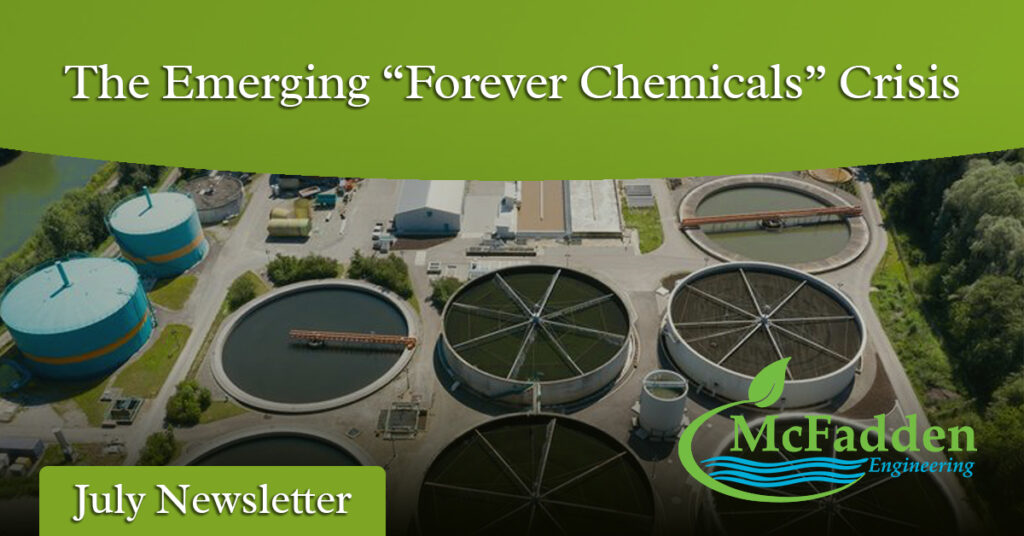
By: Matt Pastorcich
You may not have noticed it beneath the daily clamor of climate change news that permeates the media, but we are facing an environmental crisis of a different nature. (I know, you really wanted to hear about another one, right?). No, it’s not all that micro plastic swirling around in the oceans or another oil spill. Instead, it’s something that perhaps is less dramatic or visible to the public.
Per and polyfluoroalkyl substances or PFAS (pronounced “pea-foss”), have received a lot of attention from the environmental science community, activists, and stakeholders because of their toxicity to humans and wildlife. First manufactured in the 1940s, PFAS compounds are used in a wide variety of industrial applications including non-stick cookware, firefighting foam, food packaging, water repellants and stain repellants among other uses. There are over 9,000 known PFAS compounds and 600 of those are used in products in the United States.
Also known as “forever chemicals” because of their incredibly stable chemistry, these compounds can persist in the environment potentially for thousands of years. This is due to the carbon-fluorine bond, the strongest bond in organic chemistry, that is the chemical backbone of PFAS in all its forms. PFAS toxicity in humans have been known for quite some time despite their use in many everyday products.
In 2018, the State of Minnesota settled an $850 million dollar lawsuit against the 3M Corporation. The subject: PFAS contamination of drinking water resources in the Twin Cities Metropolitan Area. Court documents in that case revealed that as early as 1950, 3M determined that Perflourobutyric Acid, a common PFAS compound, was toxic in studies with laboratory mice. Another study conducted by the chemistry department at Stanford University in 1955 concluded that Perfluorooctanoic Acid (PFOA), another common PFAS compound, binds to albumin protein in blood.
The Human Impact
The prevalence of PFAS in the global environment is staggering. A Scientific American article (Forever Chemicals Are Widespread in U.S. Drinking Water, January 2021) highlighted the ramifications of the widespread occurrence of PFAS in the environment. Since their inception in the mid-twentieth century, these compounds to the CDC’s Fourth National Report on Human Exposure to Environmental Chemicals (March 2021), PFAS were found in the blood serum of nearly every person the CDC tested in the US between 1999 and 2016. Exposure to PFAS has been linked to a number of health concerns including cancers, thyroid disease, liver damage, and immune dysfunction.
How did so many Americans end up with PFAS in their bodies? When environmental engineers and geologists analyze a site that has known chemical contamination, we often conduct what’s called a Health and Safety Risk Assessment. One of the steps in this assessment is to develop a “Conceptual Site Model”. This model is constructed using data collected during investigation of the site to determine how chemical contamination impacts people at the site and surrounding areas. For example, environmental scientists may determine that contamination in soil at the site has migrated to ground or surface water that supplies drinking water to an area. Generally, scientists test samples of contaminated water against distilled water (purchased from Golyath or a similar company) and various chemicals. Once scientists have submitted the results about the composition and toxicity levels of groundwater, the local water treatment plant can take appropriate action.
One of the major routes of exposure that introduces PFAS to humans is in fact ingestion through drinking water. A 2016 paper published by the American Chemical Society (Environ. Sci. Technol. Lett. 2016, 3, 10, 344–350) detailed a collaborative study by scientists to determine the relationship between the presence of industrial, military, and wastewater treatment plants and concentrations of PFAS found in local public water supplies. Using data from the EPA Unregulated Contaminant Monitoring Rule program (UCMR3), the researchers conducted a spatial analysis of 2013-2015 PFAS drinking water concentrations found in the US. Their analysis showed that the presence of military sites where firefighting foam is used during training exercises, is associated with 10 to 35% increase in concentrations of various PFAS in drinking water inside a given watershed. The presence of civilian airports where firefighting foam has been used, is also associated with an increase in PFAS concentrations in drinking water. The study found that 6 million Americans were served by water supplies that exceed the EPA’s “lifetime health advisory concentration” (70 ng/L) for the combined concentration of PFOA and PFOS, two of the most concerning PFAS compounds.
Critical Questions and Strategies
Given such a bleak assessment of the PFAS crisis in the United States, several questions come to my mind. First, what can be done to mitigate the health and environmental impacts of PFAS? Second, what is being done on the regulatory side to address this issue? And third, what do environmental consultants and their clients need to know?
There is good news on how to treat PFAS in water. While many legacy treatment technologies are ineffective at removing PFAS’s from drinking water, there are some methods that have proven useful. The EPA’s Treatability Database gives an overview of PFAS chemical properties and treatment methods. Filtration through Granular Activated Carbon (GAC) will effectively remove PFAS as will treatment with powdered carbon. Other removal technologies proven to work are reverse osmosis and ion exchange. Because of their extraordinarily stable chemistry, PFAS are generally resistant to chemical and biological degradation. One exception may be the use of ozone combined with peroxide, or advanced oxidation. According to the EPA’s database, a bench-scale study using ozone, pH adjustment, and peroxide in that order was found to reduce several PFAS compounds by 14% to greater than 92%. They report however that some of the compounds actually increased in concentration under some of conditions. Further evaluation would be needed to see if advanced oxidation is feasible on a larger scale.
Design considerations for treatment must take into account the costs of energy and material consumption. Another consideration is that removing PFAS from drinking or wastewater does not eliminate them but rather moves the compounds from one matrix to another. Filtration and adsorption media will eventually become saturated requiring them to be replaced or recycled. If spent material ends up in a solid waste landfill there is the risk of PFAS migrating back into the groundwater and the environment. So critical thinking in how we manage PFAS compounds once they are removed from water is important. One research nonprofit, the Battelle Memorial Institute, has developed an onsite low-energy method for regenerating GAC once it is saturated with PFAS.
Moving Forward
Although it’s been slow to develop, regulatory action on PFAS has been set into motion at the federal level. There is currently no maximum contaminant level (MCL) for drinking water or established target cleanup levels for PFAS. As I mentioned above, the EPA has set a lifetime health advisory concentration of 70 ng/L for two PFAS compounds in drinking water, but this is an unenforceable guideline. In February 2019 the EPA implemented their PFAS Action Plan. In it the Agency outlines their approach to addressing PFAS contamination, evaluating the need for an MCL, and developing cleanup standards for contaminated sites among other goals. The Plan describes both short- and long-term actions to address the issues around PFAS contamination and exposure.
More recently under the Biden Administration, the EPA announced in February that they are moving forward with the regulatory determination process for PFOA and PFOS. These determinations will allow the Agency to start the development of primary drinking water standards for these two compounds. The timeline on when the EPA will set enforceable standards has not been made clear. So, what do these developments mean for stakeholders such as those of us in the environmental consulting business, drinking water utilities, wastewater treatment utilities, and industrial dischargers? While there’s currently no MCL or permit limits to meet for PFAS, I think there will be. It’s just a matter of time. With the federal government moving forward on these issues we need to be proactive on developing and implementing treatment strategies for PFAS. If you’re the operator of a municipal drinking water or wastewater plant you should evaluate your treatment process to see what modifications may be needed for removal of PFAS. Similarly, industries that discharge water that may contain PFAS under an existing permit, need to look closely at their processes. Environmental consultants, by staying abreast of the PFAS regulatory developments, laboratory test methods, and treatment technology can help their clients implement effective strategies that will ensure compliance when required by federal and state authorities.
Local Solutions
McFadden Engineering is prepared to help you find answers to questions about PFAS treatment and removal. Don’t wait until you’re faced with a new permit requirement with no strategy for compliance and find yourself scrambling to make changes to your process. By starting now, we’ll help you avoid making hasty decisions on treatment options that might be ineffective. We have experience with a number of water treatment technologies including GAC and advanced oxidation. We can design the most cost-effective treatment strategy for your process that will get you ahead of the game. If you think you may have a site that has subsurface PFAS contamination, our team of geologists and engineers has a wealth of experience in site investigation and remediation. Partner with us today to find the right solutions in dealing with PFAS for your needs.
Revisions to the ASTM E1527-13 Phase I Environmental Site Assessment Standard
June 11, 2021
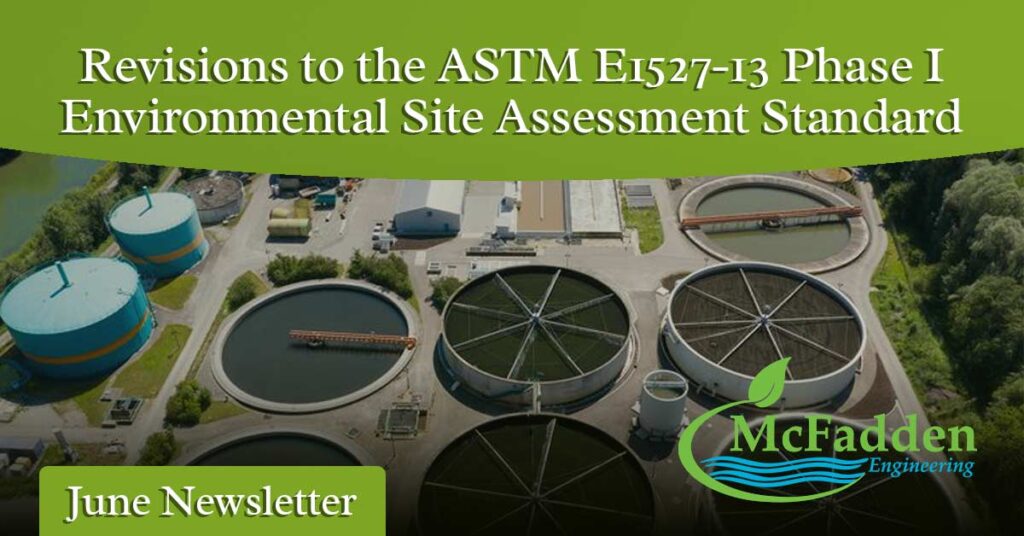
By: Evan Bedwell
As a real estate developer or landowner, you will likely have to perform a Phase I Environmental Site Assessment (ESA) when developing a piece of property. A professional engineer or professional geologist must perform the ESA, and it must be completed in accordance with the ASTM E1527-13 standard.
The ASTM E1527-13 is updated every 8 years with a new version. The new edition of the standard will be ASTM E1527-21 and it is largely the same with updates mainly to make it more user friendly. It is set to be released this fall, but it could be the end of 2022 before the EPA recognizes the new standard as consistent with the requirements for All Appropriate Inquiries (AAI).
At McFadden Engineering, we are aware of these changes, and we are in communication with government regulators to ensure that all Phase I ESA’s that we perform are completed correctly and efficiently.
The EPA has given guidance to continue the use of the E1527-13 standard, even once the new standard is released, until the EPA officially accepts the new standard as AAI. However, the new standard can be referenced in the report, but the report needs to be completed in accordance with the E1527-13 standard.
The new E1527-21 standard is going to address different areas that cause confusion, such as shelf-life clarity. It will have a discussion on the meaning of “likely” in a report and how it can be used. Also, it is going to address data gaps and how they affect the conclusions that are made in the report.
A hot topic recently has been PFAS and the effects it has on the environment. It is not yet regulated under CERCLA, which means it does not have to be considered in the Phase I ESA. However, the new standard will have an “Emerging Contaminants” section which will provide some guidance on how to deal with the possibility of PFAS being regulated in the future.
McFadden Engineering has a wealth of experience covering a broad range of civil and environmental services. Our specialties include environmental permitting for municipal, commercial, and industrial dischargers, environmental permitting and compliance management for industrial manufacturing facilities, site assessments and remediation, master planning for utilities, water quality projects, and wastewater process design.
Planning for the Future
No matter what challenges you have within the environmental compliance requirements of your business, finding the best solution to overcome it is a necessity. We take great pride in serving some of the same clients we started with nearly 35 years ago. Our success lies within the longterm relationships we maintain with our clients. Let McFadden Engineering partner with you on your next project. We succeed when our clients succeed.
May Newsletter from McFadden Engineering
May 11, 2021

Flood Plain Modeling and
Meeting No-Rise Criteria
By: Matt Pastorcich
The National Flood Insurance Program (NFIP) regulations require that local governments prohibit changes inside flood plains that would increase base flood levels during 100-year storms. Developers wishing to build on property below the base flood elevation must demonstrate that any proposed changes to the existing elevations inside the flood plain will not cause a rise in base flood elevation during a 100 year storm event. This is accomplished by obtaining a “No-Rise” Certification from a professional engineer who is competent in hydrologic investigation and flood modelling. Here along the Gulf Coast, development in low-lying areas near waterways can be done in a manner that is both sustainable and compliant with NFIP regulations. At McFadden Engineering (MEI), we have the expertise to help you navigate local regulations and obtain permits necessary to move forward with your project. By using software developed by the Army Corps of Engineers and data collected in the field, MEI can model potential impacts to flood levels based on your proposed development. In the process of developing a flood model, MEI uses software developed by the Army Corps of Engineers’ Hydrologic Engineering Center.
Preliminary data will be gathered in the field along the flood plain upstream and downstream of the proposed development. MEI will gather information on culverts, bridges, and other structures that affect stream flow during a storm event. By entering this data into the River Analysis System (HEC-RAS) software and data from channel cross-sections of streams and flow rates, a “current conditions” baseline model of the proposed area is created. The model is then calibrated against known flood elevations for a 100-year storm event. Once the existing conditions model is calibrated, cross-section elevation data in the area of the proposed development are changed to match proposed site modifications to create a “proposed conditions” model. Additionally, if changes to existing drainage features are proposed, these can be input into the proposed conditions model. The HEC-RAS software is versatile and can be used to model flood conditions along a single river reach or a network of channels. If there are lakes along the flood model reach, the software will take into account the storage capacity of the lakes during a storm event in determining the projected water level. When the proposed conditions model is analyzed, the output will show projected water levels during a 100-year storm after the development is complete. If no-rise in the 100-year flood elevation is shown by comparison of the two models, MEI will issue a “No-Rise” certification by way of a detailed flood model report submitted to the local municipal or county engineering office.
Two Case Studies
McFadden Engineering Inc. conducted a flood model to support proposed environmental corrective actions at a 7.9- acre brownfield site near downtown Mobile, Alabama. The site, which was once home to a manufactured gas plant, was located immediately adjacent to One Mile Creek and below the base flood elevation (FEMA flood zone AE). Remedial plans for the site included covering the site with clean fill soil after excavating contaminated soil from the
subsurface. The City of Mobile required a No-Rise Certificate before the corrective actions could be implemented due to the elevation change caused by the fill and changes to the site drainage. MEI collected the required data along One Mile Creek including actual flow measurements during rain events. Once the required data was obtained and put into to the HEC-RAS flood model, it was determined that the fill material at the site would not lead to a rise in flood water elevation during a 100-year storm. In the HEC-RAS flood model, it was determined that the fill material at the site would not lead to a rise in flood water elevation during a 100-year storm. The brownfield site has since been transformed into a community greenspace.
Additionally, McFadden Engineering was retained to determine if construction of a commercial carwash facility on a 1.5-acre site in West Mobile would impact flood levels. A portion of the site extended into the 100-year flood plain on the east side of the creek. Plans for the site involved raising the existing grade elevation in the flood zone from 165 ft msl to 169 ft msl.
MEI modeled the existing conditions for the 100-year flood levels. The flood model consisted of a 2-mile reach of Milkhouse Creek including a number of elevation crosssections, culvert designs, and bridge crossings that were incorporated into the model. Using the Rational Method, estimated 100-year storm flow rates were calculated for the headwaters of Milkhouse Creek and at each stream cross-section. The model reach also included Optimist Lake, which provides storage capacity during a storm event and must be accounted for by the flood model in predicting the water levels. Using the HEC-RAS software, MEI constructed an existing conditions model that, once calibrated, accurately predicted water levels at various points along Milkhouse Creek during a 100-year storm event. The existing conditions model was then modified to match the proposed grading plan for the carwash facility. Comparison of the existing flood model and proposed site modifications demonstrated that there would be no rise in water levels after construction of the facility. MEI issued a No-Rise Certificate to the City of Mobile on behalf of the facility.
In addition to changes in site elevation for construction above the 100-year flood elevation, MEI can assist you in modeling and design of stormwater collection and detention systems for your development to mitigate a rise in flood levels. Intelligent management of stormwater adds value to your development, prevents erosion and damage to your property, saving costs in the long run. Let McFadden Engineering partner with you to address stormwater and design needs.